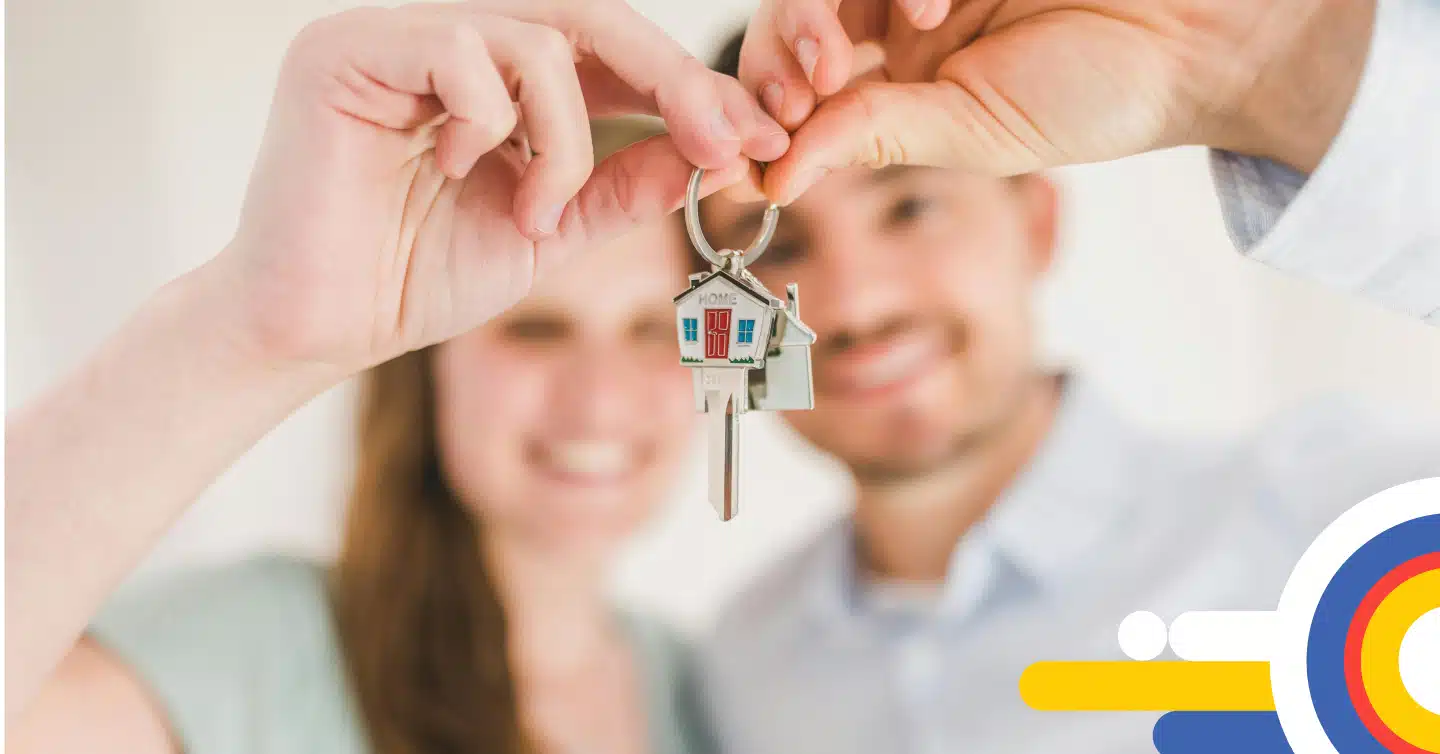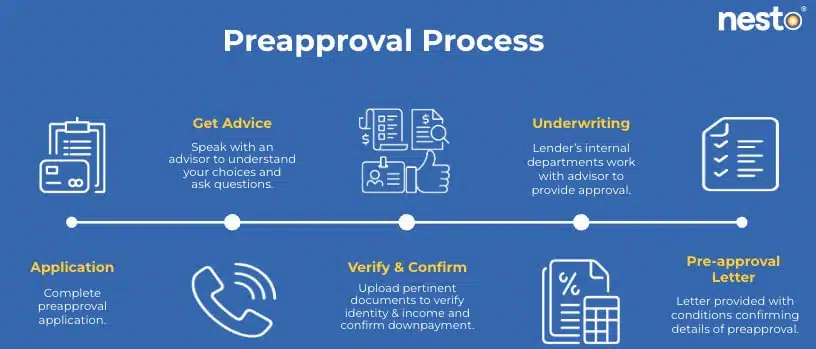Your Guide to Buying Your First Home in Canada

Table of contents
Buying your first home in Canada is a significant milestone and a substantial financial decision. If you’re unsure where to start or what happens between deciding to purchase a home and owning your home, here is a clear, step-by-step guide to the home buying process. From prepping your finances to moving in, here’s what you need to know.
Key Takeaways
- You should ready your finances, lifestyle, and expectations before starting your home search.
- A mortgage pre-qualification helps define your budget, while a mortgage pre-approval strengthens your offer.
- Understanding each step of your homeownership journey helps you move with confidence.
Step 1: Make Sure You’re Ready to Buy a Home
Before exploring listings or mortgage calculators, ensure that your finances, lifestyle, and expectations align with the realities of homeownership. A home is a long-term commitment, so ensure you’re comfortable with everything from upkeep to basic maintenance.
- Stable income and employment are key as mortgage lenders look for consistency.
- Debt levels should be manageable, allowing you to afford your monthly payments.
- Upfront costs include more than just your down payment (think home inspections, legal fees, and closing costs)
- Ongoing costs, such as property taxes, maintenance, condo fees, utilities, and repairs, can quickly add up.
Step 2: Organize Your Finances and Build Your Budget
Understanding what you can afford makes your home search much smoother. A 20% down payment avoids default insurance, but it’s not mandatory unless your home price is $1.5 million or more.
- Use tools like nesto’s mortgage affordability and mortgage payment calculators to estimate your monthly costs.
- Understand your debt service ratios (GDS and TDS), which help mortgage lenders determine your eligibility for a mortgage.
- Begin saving for a down payment (5% is the minimum in Canada, depending on purchase price) and closing costs (between 1% and 4%).
-
Consider support from programs like the Home Buyers’ Plan (HBP) and the First Home Savings Account (FHSA).
Step 3: Get Pre-Approved for a Mortgage
A mortgage pre-approval gives you a clear picture of what you can afford and shows sellers you’re a serious buyer. While it’s not a final approval, it sets the stage for a smoother, more confident homebuying experience. If you’re just getting started, a mortgage pre-qualification can be a helpful first step to understand your expectations and borrowing potential.
Work with mortgage brokers to review your options, receive personalized advice, and gather the necessary documents to proceed with your mortgage application. Once approved, you’ll receive a letter stating the amount you can borrow and a rate hold (usually valid for 90 – 120 days).
You’ll need to gather your required mortgage documents, such as:
- ID and proof of income
- Pay stubs, T4s, or self-employed income docs
- Debt and asset info
- Down payment source details

Step 4: Start Your Home Search
Now it’s time to work with a trusted real estate agent and look for properties that match your needs and budget. Always check recent sales in the area and consider a home inspection, especially for older properties or detached homes.
What to Consider:
- Location: Commute time, schools, and access to amenities and transit.
- Property type: House, condo, or townhouse (each has its pros and cons).
- Ownership structure: Freehold, condo, or co-op (each has its pros and cons).
- Condo fees: If applicable, these will increase your monthly expenses and impact your mortgage approval amount.
- Property taxes: This will increase monthly expenses and affect the mortgage amount you qualify for.
- Home inspection: Consider completing a home inspection before waiving your finance conditions.
- Potential repairs: If a full appraisal is required, any significant renovations or repairs could impact your approval.
Get approval on your low rate today
No big bank bias, just commission-free experts ready to help you.
Step 5: Make an Offer
Once you’ve found a home that feels like the right fit, the next step is to move forward with making an offer and beginning the homeownership process. Ensure your mortgage approval is solid and that you’re comfortable with any financing conditions on your purchase before waiving them.
- Work with your realtor to submit an offer with conditions (such as financing, inspection, etc.).
- Provide a deposit (to your realtor’s trust account) once your offer is accepted, usually 1–5% of the purchase price.
- Be ready to negotiate terms and conditions through your realtor, such as price, closing date, and inclusions.
- Once accepted, the offer becomes a binding agreement
- Now work with your mortgage lender to firm up your mortgage approval (this includes due diligence on the subject property).
- Secure your property insurance, as your lawyer or notary will need to see that it’s in place on your closing day.
Step 6: Prepare for Closing Day
Closing is when ownership officially changes hands, and many things need to align. Your mortgage lender will send instructions to coordinate with your lawyer or notary to finalize the transaction, register the title, and transfer the funds.
| Costs to Expect | Typical Cost |
|---|---|
| Legal fees | $1,000–$3,000 |
| Land transfer tax | Varies by province (rebates available) |
| Home inspection | $500–$1,500 |
| Appraisal | $300–$500 |
| Title insurance | ~$300 |
| PST on insurance | 6%–9% in ON, QC, SK |
| Prepaid taxes/utilities | Prorated on closing |
Step 7: Move In and Settle Into Homeownership
Once you’ve got the keys, your homeownership journey begins. If you used incentives like the Home Buyer’s Plan or other programs, keep track of any repayment timelines. Here’s what you’ll need to manage:
- Update your utilities and notify all relevant parties, including the Canada Revenue Agency (CRA), if this will be your primary residence.
- Set aside a repair fund for unexpected issues
- Start making regular mortgage payments
- Review your budget regularly as a homeowner; keep spending, saving, and household funds separate to make it easier to manage your budget.
First-Time Buyer Programs That Can Help
You can combine multiple first-time homebuyer programs as long as you meet the eligibility requirements of each program. For example, if you buy in Toronto, you can receive both the provincial and municipal land transfer tax rebates for a total rebate of $8,475. You can also take advantage of all other programs like the HBP, FHSA, and any other tax credits and rebates to boost your savings.
Here’s a quick look at the top federal and provincial programs that may reduce your costs:
| Program | Benefit |
|---|---|
| Home Buyers’ Plan (HBP) | Withdraw up to $60,000 from your RRSP tax-free, pay it back over 15 years |
| First Home Savings Account (FHSA) | Save up to $40,000 tax-free for your down payment |
| First-Time Home Buyers Tax Credit | Up to $1,500 tax relief |
| GST/HST Rebate | Refund on federal tax for new homes |
| Land Transfer Tax Rebates |
ON – up to $4,000 BC – up to $8,000 PEI – up to $2,000 Toronto – up to $4,475 Montreal – up to $15,000 |
Frequently Asked Questions (FAQ) About Buying Your First Home in Canada
What is the first step to buying a home in Canada as a first-time buyer?
The first step is making sure you’re financially and personally ready, with steady income, manageable debt, and a clear understanding of upfront and ongoing costs.
How much do I need for a down payment as a first-time buyer in Canada?
You need at least 5% of the home’s purchase price, but you can boost your down payment using programs like the FHSA or RRSP Home Buyers’ Plan.
What is the difference between a mortgage pre-qualification and pre-approval?
Pre-qualification gives you a general idea of your budget, while pre-approval confirms how much you can borrow and locks in your mortgage rate.
What are the key costs I should expect before closing on my first home?
Expect to pay for legal fees, a home inspection, land transfer tax, title insurance, and possibly an appraisal or prepaid utility adjustments. It’s recommended that you budget between1% and 4% of the purchase price and the location of your property.
Can I combine first-time home buyer programs in Canada?
Yes, as long as you meet the criteria, you can combine programs like the FHSA, HBP, tax rebates, and land transfer tax refunds to lower your upfront costs.
Final Thoughts
Buying your first home might seem overwhelming, but it doesn’t have to be. With the customized guidance and a clear plan, the path to homeownership becomes much easier to follow. When you understand each step, from budgeting to making an offer, you can move forward with confidence and clarity.
If you’re ready to explore your home financing options or just want honest advice to help you get started, nesto mortgage experts are here to guide you through every part of your homeownership journey. Let’s make your first home purchase easier and simpler.
Ready to get started?
In just a few clicks, you can see our current rates. Then apply for your mortgage online in minutes!














